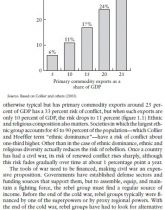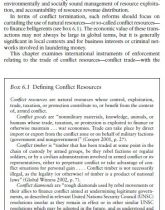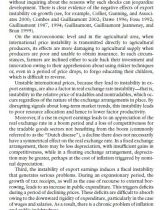Hledej
Zobraz:
Univerzity
Kategorie
Rozšířené vyhledávání
12 662
projektů
Natural Resources and Violent Conflict
| Přípona |
Typ studijní materiál |
Stažené 0 x |
| Velikost 1,9 MB |
Jazyk anglický |
ID projektu 9554 |
| Poslední úprava 06.02.2017 |
Zobrazeno 1 078 x |
Autor: clean.bandit |
 Sdílej na Facebooku
Sdílej na Facebooku |
||
| Detaily projektu | ||
- Cena:
4 Kreditů - kvalita:
82,8% -
Stáhni
- Přidej na srovnání
- Univerzita:Masarykova univerzita
- Fakulta:Fakulta sociálních studií
- Kategorie:Humanitní vědy » Politologie
- Předmět:-
- Studijní obor:Bezpečnostní a strategická studia
- Ročník:5. ročník
- Formát:PDF dokument (.pdf)
- Rozsah A4:429 stran
RECENT RESEARCH UNDERTAKEN BY THE World Bank and others suggests that developing countries face substantially higher risks of violent conflict and poor governance if they are highly dependent on primary commodities. Revenues from the legal or illegal exploitation of natural resources have financed devastating conflicts in a large number of countries across regions. When a conflict erupts, it not only sweeps away decades of painstaking development efforts but also creates costs and consequences—economic, social, political, regional—that live on for decades. The outbreak of violent domestic conflict amounts to a spectacular failure of development—in essence, development in reverse. Even where countries initially manage to avoid violent conflict, large rents from natural resources can weaken state structures and make governments less accountable, often leading to the emergence of secessionist rebellions and all-out civil war.
Natural resources are never the sole source of conflict, and they do not make conflict inevitable. But the presence of abundant primary commodities, especially in low-income countries, exacerbates the risks of conflict and, if conflict does break out, tends to prolong it and makes it harder to resolve.
Reflecting a growing interest in the links between natural resources and conflict and the World Bank’s evolving conflict agenda—which is placing greater emphasis on preventing conflicts—in 2002, the World Bank’s Conflict Prevention and Reconstruction Unit and the Development Research Group began to define a research project to address this link. As the Governance of Natural Resources Project took shape, the discussion moved toward practical approaches and policies that could be adopted by the international community. While there is much that individual developing countries can do to reduce the risk of conflict—by addressing genuine grievances in their societies, adopting economic and social policies that are more inclusive, and improving transparency and accountability—there is also a need to articulate a convincing and practical agenda for global action. As members of the international community working to build a world that is safer and free of poverty, we share a global responsibility in assisting developing countries to ensure that revenues from the exploitation of natural resources do not exacerbate the risk of conflict.
Natural resources are never the sole source of conflict, and they do not make conflict inevitable. But the presence of abundant primary commodities, especially in low-income countries, exacerbates the risks of conflict and, if conflict does break out, tends to prolong it and makes it harder to resolve.
Reflecting a growing interest in the links between natural resources and conflict and the World Bank’s evolving conflict agenda—which is placing greater emphasis on preventing conflicts—in 2002, the World Bank’s Conflict Prevention and Reconstruction Unit and the Development Research Group began to define a research project to address this link. As the Governance of Natural Resources Project took shape, the discussion moved toward practical approaches and policies that could be adopted by the international community. While there is much that individual developing countries can do to reduce the risk of conflict—by addressing genuine grievances in their societies, adopting economic and social policies that are more inclusive, and improving transparency and accountability—there is also a need to articulate a convincing and practical agenda for global action. As members of the international community working to build a world that is safer and free of poverty, we share a global responsibility in assisting developing countries to ensure that revenues from the exploitation of natural resources do not exacerbate the risk of conflict.
Klíčová slova:
conflict
violence
natural resources
policies
approaches
conflict risk
Obsah:
- Preface
Contributors
Acronyms and Abbreviations
1. Natural Resources and Conflict: What We Can Do 1
Ian Bannon and Paul Collier
2. The Natural Resource Curse: How Wealth Can
Make You Poor 17
Michael Ross
3. Who Gets the Money? Reporting Resource Revenues 43
Philip Swanson, Mai Oldgard, and Leiv Lunde
4. Where Did It Come From? Commodity
Tracking Systems 97
Corene Crossin, Gavin Hayman, and Simon Taylor
5. Follow the Money: The Finance of Illicit
Resource Extraction 161
Jonathan M. Winer and Trifin J. Roule
6. Getting It Done: Instruments of Enforcement 215
Philippe Le Billon
7. Attracting Reputable Companies to Risky Environments:
Petroleum and Mining Companies 287
John Bray
8. Dampening Price Shocks 353
Patrick Guillaumont and Sylviane
Guillaumont Jeanneney
Boxes
3.1 The Azerbaijan ROSC 61
3.2 Highlights of the East Asia FLEG Ministerial Declaration 63
3.3 MMSD Suggestions Relevant to Revenue Transparency 74
3.4 Recommendations of Global Witness 77
3.5 Constitutional Basis for the Role of the Auditor General in Botswana 83
3.6 Control and Monitoring Institutions in Chad 89
4.1 Independent Validation of Legal Timber 116
6.1 Defining Conflict Resources 216
6.2 NEPAD and the G-8 Africa Action Plan 252
6.3 Mandatory Conflict Impact Assessment and Code of Conduct 259
Figures
1.1 Natural Resources and Conflict Risk in Low-Income Countries 3
1.2 Risks from Natural Resources 5
3.1 Lines of Accountability in the State Oil Fund of Azerbaijan 85
4.1 Measures to Build Bridges between Related Tracking Systems 109
4.2 Common Elements of Effective Certification Tracking Systems 113
4.3 Forest Stewardship Council Chain-of-Custody Certification 115
4.4 Coltan Extraction Chain from Eastern Democratic Republic of Congo 135
6.1 Economic Supervision Scheme during Peace Processes 253
Tables
2.1 Civil Wars Linked to Resource Wealth, 1990-2002 18
2.2 Armed Conflicts in Africa and the Rest of the World, 1989-2001 18
2.3 Civil Violence in Africa by Decade, 1970-99 19
2.4 Resource Dependency: Nonfuel Mineral-Dependent States and Oil-Dependent States 21
2.5 Mean OECD Tariffs on Processed and Unprocessed Extractive Products 23
2.6 Mineral Resources and Secessionist Movements, 1949-Present 27
4.1 Major Commodity Tracking Regimes 99
4.2 Forest Product Monitoring Technologies 120
6.1 Overview of International Instruments of Enforcement 225
6.2 UN Security Council Sanctions against Natural Resource Exports 232
7.1 Companies Deterred from an Otherwise Attractive Investment by a Country’s Reputation for Corruption, by Sector 295
7.2 Companies Deterred from an Otherwise Attractive Investment by a Country’s Reputation for a Poor Human Rights Record, by Sector 296
7.3 Standards of Compliance among Companies from Top-10 OECD Exporters, 1999 and 2002 308
7.4 Standards of Compliance among Companies from Select Non-OECD Countries, 1999 and 2002 309
7.5 How Often Do International Companies Use Political Pressure from Their Home Governments to Gain Business Advantage? 319
7.6 How Often Do International Companies Use Tied Aid to Gain Business Advantage? 320


